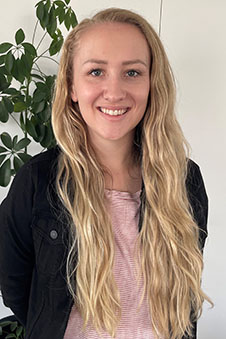

Caitlin Helme
Caitlin Helme, BA(Hons): In recognition for support of disability justice.
Caitlin is paving the way for disabled sexual violence survivors to receive equitable support and care. Passionate about disability justice and the intersection of marginalised identities, she is a past holder of the New Zealand Psychological Society Social Justice Scholarship, and a two-time recipient of the Ian Campbell Scholarship that supports physically disabled students working towards qualifications that promote the wellbeing of disabled people.
What was your reaction to receiving the award, and what does it mean to you?
I was really surprised and incredibly humbled to hear I'd been selected. I don't think anyone who goes into a helping profession does it for any kind of recognition, but it does feel pretty special to be commended.
What have you done since graduation and what are you doing now?
I'm currently completing my clinical psychology internship in a district health board pain team, alongside finishing my doctoral thesis. I'm thoroughly enjoying my client work; with a passion for disability justice and equity it feels like a particularly meaningful team to be working with.
My thesis is exploring how we best support disabled sexual violence survivors who experience complex layers of inequity, although it's now taken on quite a COVID flavour! It's an absolute privilege to be entrusted with victim/survivors' stories, as well as those of the service providers who work with victim/survivors, to hopefully make an impact in this sector.
What inspires and motivates you to work in the areas you are involved with?
There is no question that both the disability community and people harmed by sexual violence have long been silenced and labelled as unimportant. Seeing the progress that has already been made in these areas is motivating in itself, but everyday I also see how far we have yet to go. There will always be work to be done, and from my end that doesn't stop until we have an end to sexual violence, alongside equitable service provision for all people.
At an individual level, being able to work with people to embrace who they are and be unapologetically themselves — no matter their access needs or lived experience — is so meaningful. Seeing hope instilled in people who felt they had none will forever motivate me.
What were the highlights of your time at Otago, and has it influenced you in your career?
While from day one I knew I wanted to pursue clinical psychology, it was meeting and working with (now professor) Gareth Treharne that really shaped my focus on lived experience work. His passion for social justice was evident at every level of his mentorship and that's something that I'll never forget. Alongside that, the health psychology paper taught by Gareth and Tamlin Conner is an unforgettable highlight.